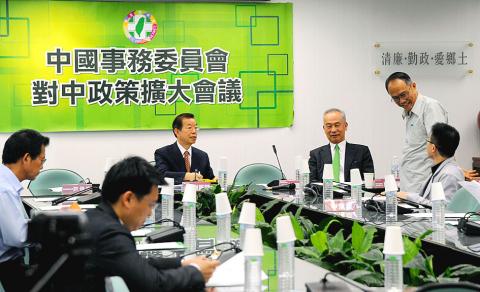The Democratic Progressive Party’s (DPP) discussion of its Taiwan independence policy again ended without a consensus yesterday, but participants agreed that the party should engage Beijing and establish an inter-party “constitutional consensus,” before forging closer ties with China.
“Participants agreed that cross-strait exchanges should not be monopolized by any party and the DPP should engage China with confidence. The party needs to fine-tune its policy to win the support of more voters and to resolve the ‘imbalance’ phenomenon,” said former premier Frank Hsieh (謝長廷), convener of an enlarged meeting of the DPP’s China Affairs Committee (CAC).
“The third consensus [of the meeting] was that the DPP should promote constitutionalism in Taiwan and make constitutional consensus [between political parties] the foundation of cross-strait dialogue,” he added.

Photo: CNA
Hsieh denied that the issue of eliminating the party’s Taiwan independence chapter, which has existed since 1991, was discussed at the meeting. However, participants mentioned the formulation of a new resolution, which supposedly would “replace” the previous resolution.
The DPP’s position on Taiwan’s national status has been largely defined by its party charter, which mentions the establishment of the Republic of Taiwan, and its resolution on Taiwan’s future of 1999, which defines Taiwan as a sovereign country separate from China, while acknowledging the Republic of China (ROC) as the nation’s formal title.
However, several DPP members argued that the position is why Beijing has refused to engage in dialogue with the party and that the policy would have to be adjusted so that people would have confidence in the DPP’s ability to manage cross-strait relations.
Tung Cheng-yuan (童振源), a professor at National Chengchi University who previously served as deputy minister of the Mainland Affairs Council, proposed that the party enact an “ROC resolution” which pledges that it would no longer attempt to change the nation’s formal title and establish a Republic of Taiwan.
The fundamental problem does not lie in the Taiwan independence policy, but in the party’s resolution on normalization of the country in 2007, which denounced the legality of the ROC government, former DPP chairman Hsu Hsin-liang (許信良) said after the meeting.
Several participants did mention the formulation of a new resolution for the DPP to better manage future cross-strait relations at the meeting, Hsu said.
“I don’t think the elimination of a past resolution would be meaningful. The problem is whether you can come up with a new resolution as the party’s guidance for the future,” Hsu said.

Alain Robert, known as the "French Spider-Man," praised Alex Honnold as exceptionally well-prepared after the US climber completed a free solo ascent of Taipei 101 yesterday. Robert said Honnold's ascent of the 508m-tall skyscraper in just more than one-and-a-half hours without using safety ropes or equipment was a remarkable achievement. "This is my life," he said in an interview conducted in French, adding that he liked the feeling of being "on the edge of danger." The 63-year-old Frenchman climbed Taipei 101 using ropes in December 2004, taking about four hours to reach the top. On a one-to-10 scale of difficulty, Robert said Taipei 101

Nipah virus infection is to be officially listed as a category 5 notifiable infectious disease in Taiwan in March, while clinical treatment guidelines are being formulated, the Centers for Disease Control (CDC) said yesterday. With Nipah infections being reported in other countries and considering its relatively high fatality rate, the centers on Jan. 16 announced that it would be listed as a notifiable infectious disease to bolster the nation’s systematic early warning system and increase public awareness, the CDC said. Bangladesh reported four fatal cases last year in separate districts, with three linked to raw date palm sap consumption, CDC Epidemic Intelligence

US climber Alex Honnold left Taiwan this morning a day after completing a free-solo ascent of Taipei 101, a feat that drew cheers from onlookers and gained widespread international attention. Honnold yesterday scaled the 101-story skyscraper without a rope or safety harness. The climb — the highest urban free-solo ascent ever attempted — took just more than 90 minutes and was streamed live on Netflix. It was covered by major international news outlets including CNN, the New York Times, the Guardian and the Wall Street Journal. As Honnold prepared to leave Taiwan today, he attracted a crowd when he and his wife, Sanni,

Taiwanese and US defense groups are collaborating to introduce deployable, semi-autonomous manufacturing systems for drones and components in a boost to the nation’s supply chain resilience. Taiwan’s G-Tech Optroelectronics Corp subsidiary GTOC and the US’ Aerkomm Inc on Friday announced an agreement with fellow US-based Firestorm Lab to adopt the latter’s xCell, a technology featuring 3D printers fitted in 6.1m container units. The systems enable aerial platforms and parts to be produced in high volumes from dispersed nodes capable of rapid redeployment, to minimize the risk of enemy strikes and to meet field requirements, they said. Firestorm chief technology officer Ian Muceus said